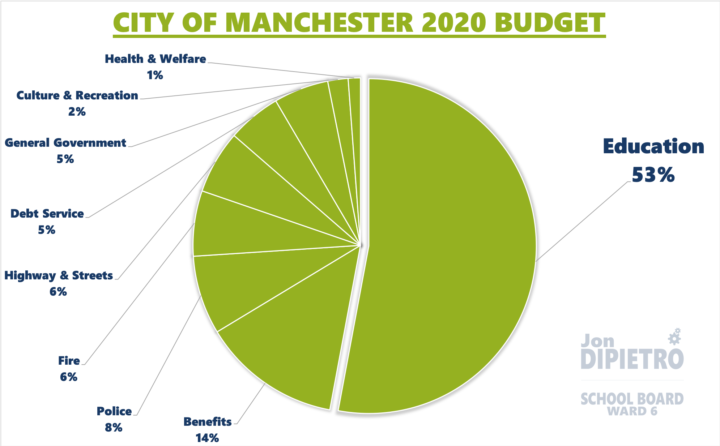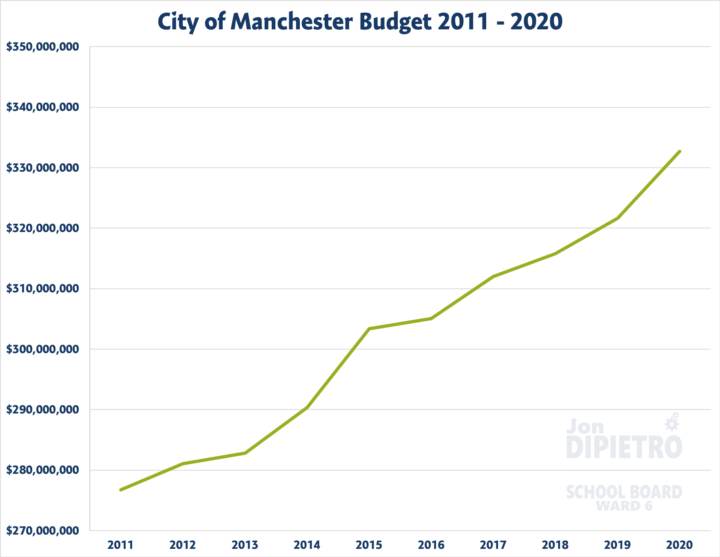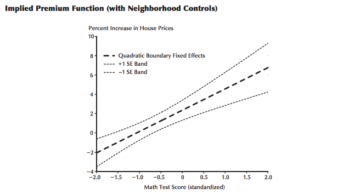“Oh, I don’t have any kids in school.”
By far, that’s the most common response I hear when I introduce myself to folks as a candidate for Board of School Committee. I understand why people say this. I’d probably say the same thing if I were in their shoes. I doubt I’d be paying all that much attention were it not for the fact that my kids have spent a combined 30 school years (so far) in the city’s public schools. Heck, school board members even draw half the stipend that aldermen receive. So the school board mustn’t be that important, right?
Now that I have been examining the district in detail for the past several years, it’s clear to me that the Board of School Committee is at least as important to the city as the Board of Mayor and Aldermen.
When you take a look at the big picture, there are three reasons why every citizen (and taxpayer) should care about the school board:
- Budget: The Manchester School District comprises a whopping 53% of the city’s $333 million budget.
- Property Values: If the Manchester School District could improve its test scores, the city could theoretically generate an additional $12.6M in property tax revenue.
- Educated Citizenry: The more our schools can contribute to knowledgeable, productive citizens, the better off our city will be.
#1 – The Budget
As is evident in the following chart, the Manchester School District budget dwarfs every other department. By itself, it comprises a whopping 53% of the city’s $333 million budget. It’s 8.4 times larger than the police department budget and 3.8 times larger than police and fire COMBINED.

This means that the school district has far-reaching effects, influencing funding for every other city service. Nearly half (48%) of the $56M in increased spending by the city since 2011 has gone to the school district. It’s critical that such a large investment of city resources is spent well. In the end, it’s the Aldermen who approve the entire city budget and, thus, the school district’s budget. However, the school board decides what budget to send and, ultimately, how that budget is spent. There is no line-item veto or control.
Once the budget is approved, it is up to the school board and administration to make all decisions about how to spend that money. A well-run district will minimize the financial impact and maximize the return on investment. A poorly-run district will hamstring the city year after year.
The following table lists budget expenditures for the City of Manchester in millions of dollars:
| 2020 | 2019 | 2018 | 2017 | 2016 | 2015 | 2014 | 2013 | 2012 | 2011 | |
|---|---|---|---|---|---|---|---|---|---|---|
| Education | $176.04 | $169.43 | $167.01 | $165.2 | $161.1 | $159.6 | $156.7 | $152.2 | $150.2 | $148.7 |
| General Government | $17.62 | $16.54 | $16.45 | $16.4 | $16.0 | $16.0 | $15.8 | $15.5 | $15.3 | $17.8 |
| Public Safety | $46.26 | $44.99 | $44.2 | $41.6 | $41.6 | $41.6 | $40.4 | $39.6 | $37.5 | $37.5 |
| Highway and Streets | $20.33 | $19.36 | $19.47 | $19.3 | $20.1 | $20.1 | $19.5 | $19.0 | $19.3 | $19.4 |
| Health and Welfare | $3.83 | $3.88 | $3.76 | $3.8 | $3.8 | $3.8 | $3.8 | $3.7 | $3.7 | $3.7 |
| Culture & Recreation | $6.52 | $6.28 | $6.28 | $6.3 | $5.1 | $5.1 | $5.1 | $5.0 | $5.1 | $4.8 |
| Economic Development | $0.15 | $0.14 | $0.14 | $0.1 | $0.1 | $0.1 | $0.1 | $0.2 | $0.2 | $0.3 |
| Non-Departmental Benefits | $44.62 | $43.77 | $40.72 | $41.5 | $39.9 | $39.4 | $30.9 | $29.4 | $31.5 | $29.9 |
| Debt Service | $17.21 | $17.21 | $17.71 | $17.7 | $17.3 | $17.6 | $18.2 | $18.2 | $18.3 | $14.6 |
| Total | $332.68 | $321.62 | $315.74 | $312.0 | $305.0 | $303.3 | $290.4 | $282.8 | $281.0 | $276.7 |

#2 – Property Values
It’s widely accepted that school quality affects property value. But how much? Let’s take a look at the math and put it in perspective. In June 2010, the St. Louis Federal Reserve published a paper titled Nonlinear Effects of School Quality on House Prices:
 “We reexamine the relationship between quality of public schools and house prices and find it to be nonlinear. Unlike most studies in the literature, we find that the price premium parents must pay to buy a house in an area associated with a better school increases as school quality increases. This is true even after controlling for neighborhood characteristics, such as the racial composition of neighborhoods, which is also capitalized into house prices. In contrast to previous studies that use the boundary discontinuity approach, we find that the price premium from school quality remains substantially large, particularly for neighborhoods associated with high-quality schools.”
“We reexamine the relationship between quality of public schools and house prices and find it to be nonlinear. Unlike most studies in the literature, we find that the price premium parents must pay to buy a house in an area associated with a better school increases as school quality increases. This is true even after controlling for neighborhood characteristics, such as the racial composition of neighborhoods, which is also capitalized into house prices. In contrast to previous studies that use the boundary discontinuity approach, we find that the price premium from school quality remains substantially large, particularly for neighborhoods associated with high-quality schools.”
What does this mean for Manchester? Let’s try a little thought exercise using the finding of this paper.
Manchester’s test scores are approximately 1.5 standard deviations below the state average. According to this study, we would expect that to result in a 1% reduction in property values. Since the median home price in Manchester is $216,900, that would mean that each homeowner is losing an average of around $2,190 in home value. If we could flip the equation and score 1.5 standard deviations above the state average, the median home value in Manchester would theoretically increase to $230,045.
Imagine what that would do to that tax base! If the Manchester School District could improve its test scores, the city could theoretically generate an additional $12.6M in property tax revenue.
#3 – Educated Citizenry
People differ in their definition of the purpose of education. Classical definitions tended to focus on preparing citizens for a “useful life.” More progressive definitions now focus on workforce development and social activism goals. Regardless of your definition, I doubt any of us want either useless or unemployable citizens. The more our schools can contribute to knowledgeable, productive citizens, the better off our city will be.
While we all probably agree on that statement, to me, it sounds a little bit like fortune cookie wisdom. How could the Manchester School District more directly influence the quality of life in the city? One way would be to address the skills gap in our job market. The country currently has 5.6 million unfilled jobs, 75% of which do not require a college degree. Many of them are lucrative trade jobs. Thanks to the Manchester School of Technology, we’re already taking steps in that direction.
Watch this short video of Mike Rowe to learn more about the skills gap:
Bottom Line
The scope of the Board of School Committee’s responsibilities may be to set policy and oversee the administration but its impact on the city are far-reaching. The financial and economic implications are enormous. In my opinion, the citizens of Manchester would do well to pay close attention to the goings-on in their school district regardless of its impact (or lack thereof) on their immediate family.



Hi Jon, Thanks for the great analysis! I am 100% in agreement that the School Board is a critical piece of our city’s success now and in the future. I have a couple questions about the $ figures just to help me better understand ed.’s place in the budget — 1) is the % of spending in Manchester similar to the % spent in other cities? and 2) do the numbers shown reflect just city revenue that comes in and goes to the schools, or external revenue sources as well (e.g., federal monies, payments from sending towns)?
I’d also be curious to hear more about your ideas for changes we could implement to better prepare our students to be effective and informed citizens. Skills training like what’s offered at MST is certainly one way. 🙂 I would also love to see us lead on offering/requiring classes on civics (including state/local gov’t as well as US), science concepts relevant to the public discourse (energy, health/biomedicine, environmental science; how to evaluate evidence and claims), and practical math/econ. I know we have amazing middle and high school teachers who could run with these curricula if we made space for them!
Hi Jacqueline – Good questions.
1) My position is that it is useless and inaccurate to compare Manchester to other NH towns. Instead, I think it’s more instructive to look at cities similar in size and socio-economic makeup. It’s not always easy to compare because many other school districts are funded at the county level and not comparable. I might do a follow-up post at another time seeing if I can find legitimate comparisons.
2) The numbers do not include debt service, transportation, or federal grant money. There is approximately $30M more that is spent on the schools that isn’t included.
I’m a proponent of mastering the basics, first. If you talk to local business owners – as I do every day for my consulting job – you will find that they cannot hire people with basic math and English literacy. I believe that a big part of this is the movement away from rote learning in favor of soft skills like critical thinking. I’d actually like to see the curriculum trimmed back a little bit, eliminating things like marketing and sports medicine. These are “nice-to-haves” right now. But I strongly agree that we should be teaching civics (this is a state requirement now) and I also think that a full year of statistics should be required. For the average citizen, it’s far more important than Algebra 2 or Calculus, in my opinion (and I’m an electrical engineer).